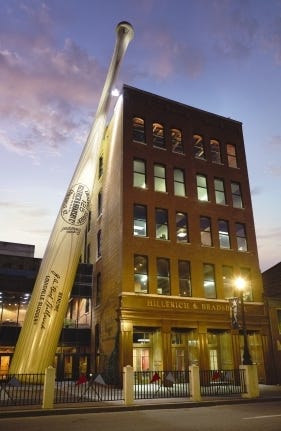The Closing of TROY’s Phenix City Campus
I wouldn’t be surprised to see more campuses close in the years to come … but TROY’s main campus might actually benefit. Also, Dr. Curtis tells us the history of the Louisville Slugger.
This is an Opinion Column.
By BILL RICE, JR.
I’m sure many Troy Citizen readers attuned to changing trends in higher education weren’t as surprised as I was by the recent news that Troy University is going to close its Phenix City campus.
However, this news did hit me out of the blue … and quickly got me thinking about what’s coming next.
As the TROY press release noted, the decision was made due to changing trends in how students receive a college education.
Basically, increasing numbers of students are opting to earn their degrees on-line instead of incurring the expense of paying tuition and routinely visiting a physical campus.
I should have seen this coming as I know from societal trends post-Covid that more and more employees are now working from home … And more students are taking classes remotely on the computer/Internet.
Dr. Wayne Curtis (see below) and myself have both recently penned articles about true inflation, which must be driving these trends as well.
Today, more than any time in my lifetime, people need to save money; taking classes on-line obviously checks this “inflation-work-around” box.
Except for its main campus in Troy, all of Troy’s campuses cater largely to the adult learner who is often pursuing a master’s degree. These adults typically have full-time jobs and are also trying to take care of families and children.
Taking classes on the laptop computer is a win-win for these students - this option saves money (less gasoline expense, etc.) and allows these students to better deal with household responsibilities.
Plus, the sought-after credential, an undergraduate or Master’s degree, is exactly the same whether a student sits through 90-minute lectures in a classroom or does his homework and research papers in his pajamas in bed.
Our family can relate …
At this writing, my wife, Carrie, is completing a Master’s Degree she never finished … on-line.
Carrie is currently taking three courses. Being a graduate student is one of at least four jobs Carrie’s somehow juggling - full time teacher, full-time mother, sales rep for Plexus products and, now, graduate student. (Many adults also have to look after older parents).
The expense of paying for these classes is another inflation work-around as, hopefully, this Master’s Degree will help Carrie earn a higher-paying, managerial-level job in the future - which will produce higher retirement benefits in the latter years or her life.
Needless to say, Carrie couldn’t juggle all of these duties if she had to drive to Montgomery and attend classes at AUM (which is where she started her uncompleted Master’s program 20 years ago).
What about Dothan and Montgomery?
I’m sure many local residents also wondered if TROY might soon close its campuses in Dothan and Montgomery. Per the university statement, this is not being discussed or isn’t envisioned.
However, I wouldn’t be surprised if both of these events happen in coming years.
This is not a negative reflection on Troy University. Every college that caters to adult students must be suffering tremendous declines in on-campus students.
(The University press release notes that “over the past 20 years, nearly 900 colleges and universities throughout the U.S. have ceased operations.”)
Indeed, I’m in the group who wouldn’t be surprised to see an even greater surge of campuses closing in the coming years and decades.
The brick-and-mortar campuses might be becoming obsolete - at least at colleges that don’t serve the traditional college student.
Thank goodness Troy’s main campus caters to the traditional college student …
Fortunately for Pike Country residents, high school graduate who are seeking the “full college experience” - including social activities, sports programs, Greek life, extracurricular programs and myriad on-campus amenities (or, perhaps, meeting a future spouse) - will still want to attend Troy’s main campus.
The beauty of our main campus is another strong selling point or feature that students must appreciate and enjoy.
Because it was an Early Adapter to on-line education, Troy University is also well-positioned to serve the growing number of students who enjoy the convenience and lower cost of an on-line education.
That is, while Troy may continue to lose students at its other campuses, its total enrollment might actually increase.
The “Troy brand” is outstanding and has been significantly enhanced thanks to the move to Division I athletics and various on-campus beautification projects.
These trends/changes might help our local campus …
Indeed, as I think more about this, if other Troy campuses are closed in the future, this might benefit residents of Pike County who want to see the University’s main campus grow and flourish.
The cost-savings from closing campuses that might be losing money could be re-invested in the Main (and frankly) most-important campus. More traditional students might end up attending TROY’s main campus.
As any student learns, the only constant is change and Big Change is probably coming to all higher education institutions (or has already arrived).
While this news is depressing for boosters and citizens of Phenix City, citizens of Troy should benefit from a thriving main campus for decades to come.
++++++++++++++++++++++++++
Chance meeting gives birth to Louisville Slugger
It’s that time of year! Baseball is in the air. This might be of interest to readers ,,,

By Dr. Wayne Curtis
Random events sometimes lead to unexpected outcomes. An encounter at a Louisville baseball game in 1884 changed the life of John “Bud” Hillerich, an apprentice in his father’s (J. F. Hillerich) woodworking firm.
Skipping work to attend the game, young Hillerich saw Louisville’s best player break his baseball bat and offered to make one for him in the woodworking shop.
The player, Pete Browning, was called the “Louisville Slugger.” The name stuck. And in 1894, Bud Hillerich patented the design, and Louisville Slugger became a household name among sports enthusiasts.
The company made history in 1905. It paid future Hall of Fame member Honus Wagner of the Pittsburgh Pirates to use his name on a bat. This was the first time an athlete endorsed a sports product.
Hillerich went on to contract with baseball’s biggest names. About 80 percent of the Hall of Fame members had contracts with Louisville Slugger.
The ownership of the firm changed in 1916. Frank Bradsby, a salesman, became a partner. And the name changed to Hillerich and Bradsby. Fast forward to 1923. Hillerich and Bradsby became the seller of baseball bats.
And the company made golf clubs …
Also in 1916, the company began manufacturing golf clubs, creating PowerBilt brand. Players using the clubs won several major golf championships — including the Masters in 1967, 1969, 1979, and 1987.
Like many other manufactures, Hillerich and Bradsby developed new products during World War II. They produced rifle stocks and billy clubs for the U.S. Army.
Adjusting to the emerging trend away from wooden bats at most levels except the minor and major leagues, the company started producing metal bats in 1970. But wooden bats remained the core business.
Louisville Slugger is now owned by the Chinese …
The company continued to operate as an independent entity until 2015. CEO John A. Hillerich IV, realizing the company could not continue to compete with larger international conglomerates with more resources, sold the company to Wilson Sporting Goods, owned by Chinese company Anta Sports.
And in 2016, it sold its PowerBilt golf club division to Hilco Streambank.
The company continues to produce the Louisville Slugger in Louisville. But it is made under contract to Wilson Sporting Goods.
For those of us who played baseball throughout the 1950s and early 1960s, the Louisville Slugger brings back many fond memories. During that bygone era, it was the gold standard among baseball bats —pure Americana. The sharp and resonant crack of a wooden bat hitting a baseball is not easily forgotten.
***
Wayne Curtis, former superintendent of Alabama banks, is a retired Troy University business school dean. Email him at wccurtis39 @gmail.com.
***
(Subscriptions to The Troy Citizen are free, although paid subscriptions are greatly appreciated.)





The role of education in general is about to change, and needs to. Kids going to primary schools like it's 1950 is so outdated that it borders on ridiculous. I believe, as you do Bill, that your large institutions will hang around, but I think they will streamline to some degree. Spending $100K on a "diploma" is getting harder to justify in a world as specialized as ours.
Finally, I knew everything about the Louisville Slugger story EXCEPT the company being owned by the Chinese. Now I must retire to bed depressed, wondering how a travesty like that could ever happen. What's next? Are they making the baseballs as well?